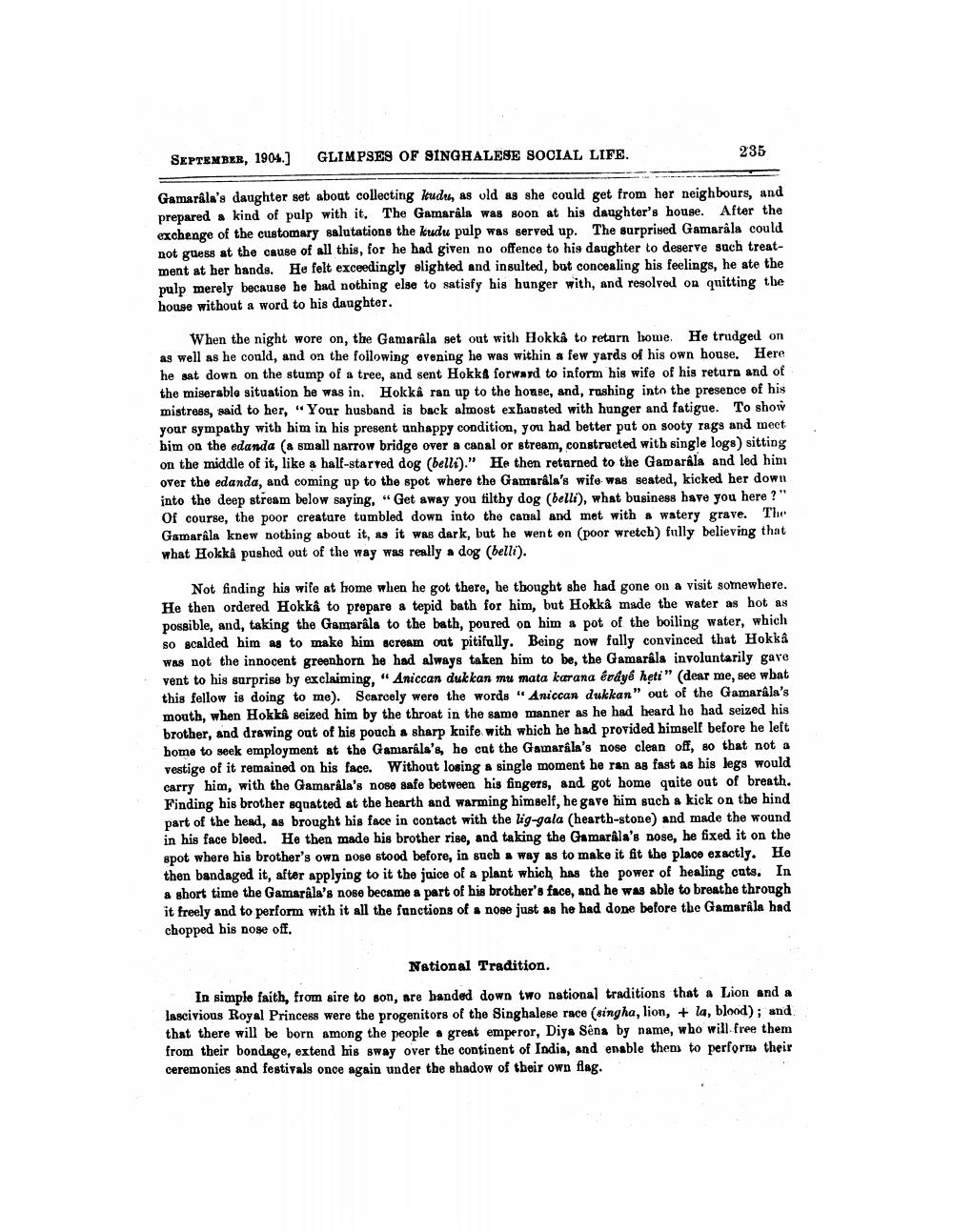________________
SEPTEMBER, 1904.)
GLIMPSES OF SINGHALESE SOCIAL LIFE.
235
Gamarala's daughter set about collecting kudu, as old as she could get from her neighbours, and prepared a kind of pulp with it. The Gamarála was soon at his daughter's house. After the exchenge of the customary salutations the kudu pulp was served up. The surprised Gamarála could not guess at the cause of all this, for he had given no offence to his daughter to deserve such treatment at her bands. He felt exceedingly slighted and insulted, but concealing his feelings, he ate the pulp merely because he had nothing else to satisfy his hunger with, and resolved on quitting the house without a word to his daughter.
When the night wore on, the Gamarála set out with Hokká to return home. He trudged on as well as he could, and on the following evening he was within a few yards of his own house. Here he sat down on the stump of a tree, and sent Hokks forward to inform his wife of his return and of the miserable situation he was in. Hokkå ran up to the house, and, rushing into the presence of his mistress, said to her, "Your husband is back almost exhausted with hunger and fatigue. To show your sympathy with him in his present unhappy condition, you had better pat on sooty rags and meet him on the edanda (a small narrow bridge over a canal or stream, constructed with single logs) sitting on the middle of it, like a half-starved dog (bellt)." He then returned to the Gamarala and led him over the edanda, and coming up to the spot where the Gamarala's wife was seated, kicked her down into the deep stream below saying, "Get away you filthy dog (bellt), what business have you here?" Of course, the poor creature tumbled down into the canal and met with a watery grave. The Gamarála knew nothing about it, as it was dark, but he went on (poor wretch) fully believing that what Hokkå pushed out of the way was really a dog (belli).
Not finding his wife at home when he got there, he thought she had gone on a visit somewhere. He then ordered Hokká to prepare a tepid bath for him, but Hokkå made the water as hot as possible, and, taking the Gamarala to the bath, poured on him a pot of the boiling water, which so scalded him as to make him scream out pitifully. Being now fally convinced that Hokkå was not the innocent greenhorn he had always taken him to be, the Gamarâla involuntarily gave vent to his surprise by exclaiming, “ Aniccan dulkan mu mata karana épayé heti" (dear me, see what this fellow is doing to me). Scarcely were the words "Aniccan dukkan" out of the Gamarâla's mouth, when Hokkå seized him by the throat in the same manner as he had heard he had seized his brother, and drawing out of his pouch a sharp knife with which he had provided himself before he left home to seek employment at the Gamarála's, he cut the Gamarala's nose clean off, so that not a vestige of it remained on his face. Without losing a single moment he ran as fast as his legs would carry him, with the Gamarala's nose safe between his fingers, and got home quite out of breath. Finding his brother squatted at the hearth and warming himself, he gave him such a kick on the hind part of the head, as brought his face in contact with the lig-gala (hearth-stone) and made the wound in his face bleed. He then made his brother rise, and taking the Gamarala's nose, he fixed it on the spot where his brother's own Dose stood before, in such a way as to make it fit the place exactly. He then bandaged it, after applying to it the juice of a plant which has the power of healing cats. In a short time the Gamarala's nose became a part of his brother's face, and he was able to breathe through it freely and to perform with it all the functions of nose just as he had done before the Gamarala had chopped his Dose off.
National Tradition.
In simple faith, from sire to son, are handed down two national traditions that a Lion and a lascivious Royal Princess were the progenitors of the Singhalese race (singha, lion, + la, blood); and that there will be born among the people a great emperor, Diys Séna by name, who will free them from their bondage, extend his sway over the continent of India, and enable them to perform their ceremonies and festivals once again under the shadow of their own flag.




